牛津译林版 八年级下 Unit4 A good read复习課件(48张PPT)
文档属性
| 名称 | 牛津译林版 八年级下 Unit4 A good read复习課件(48张PPT) |
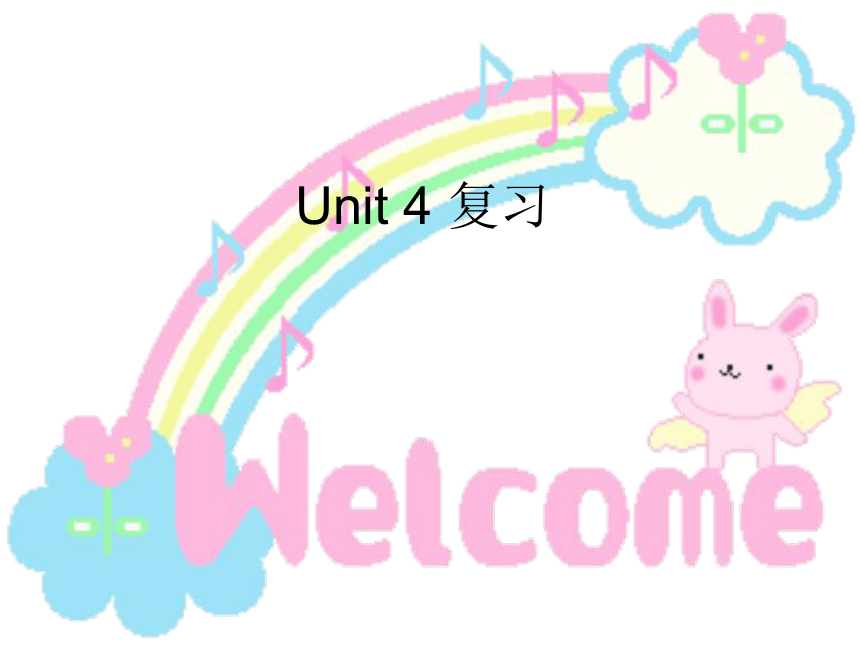
|
|
| 格式 | zip | ||
| 文件大小 | 415.2KB | ||
| 资源类型 | 教案 | ||
| 版本资源 | 牛津译林版 | ||
| 科目 | 英语 | ||
| 更新时间 | 2020-03-13 00:00:00 | ||
图片预览

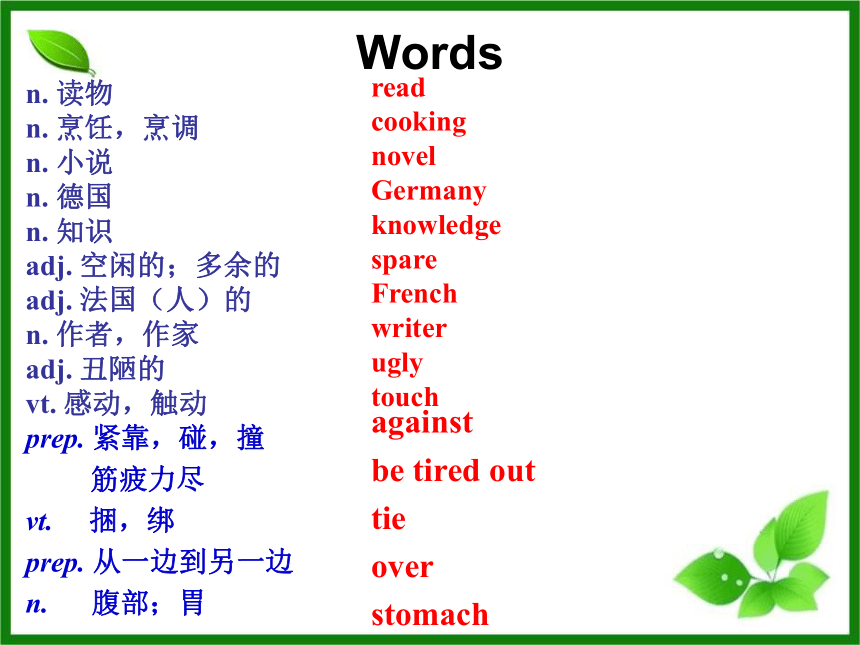
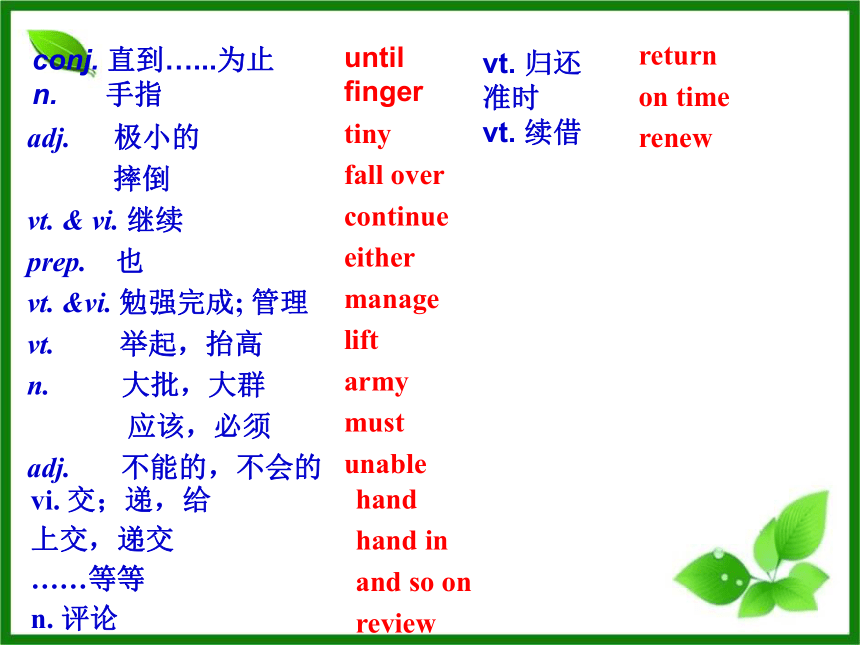
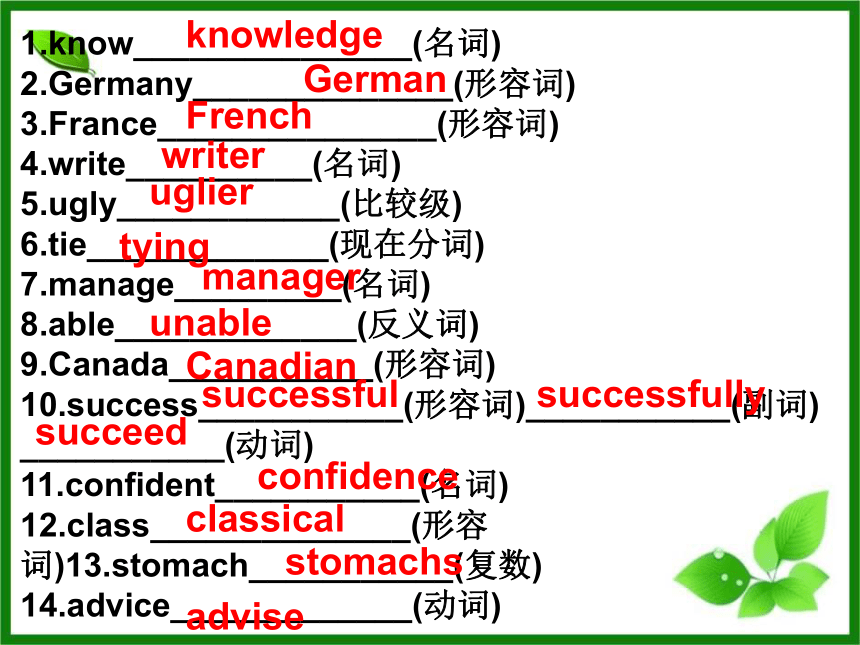
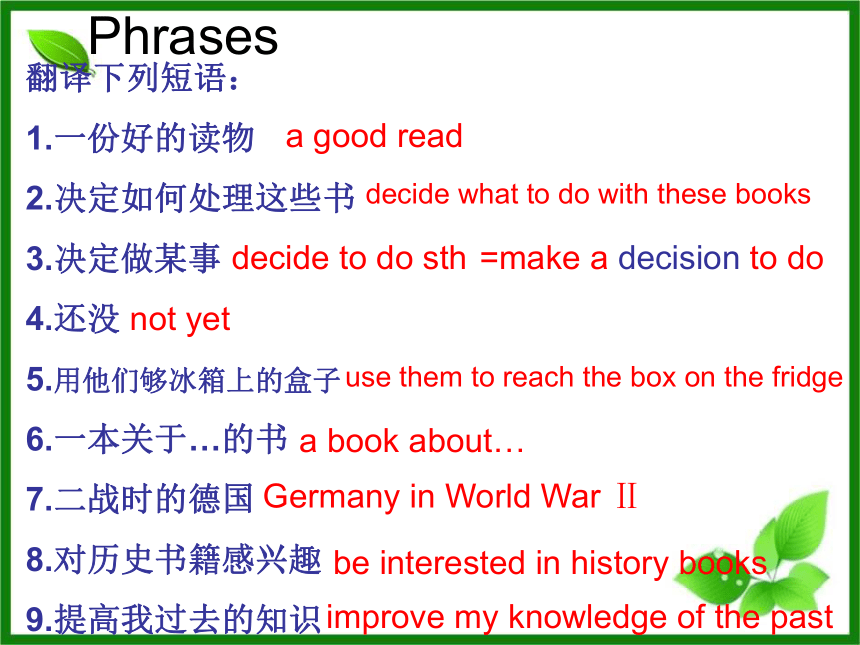
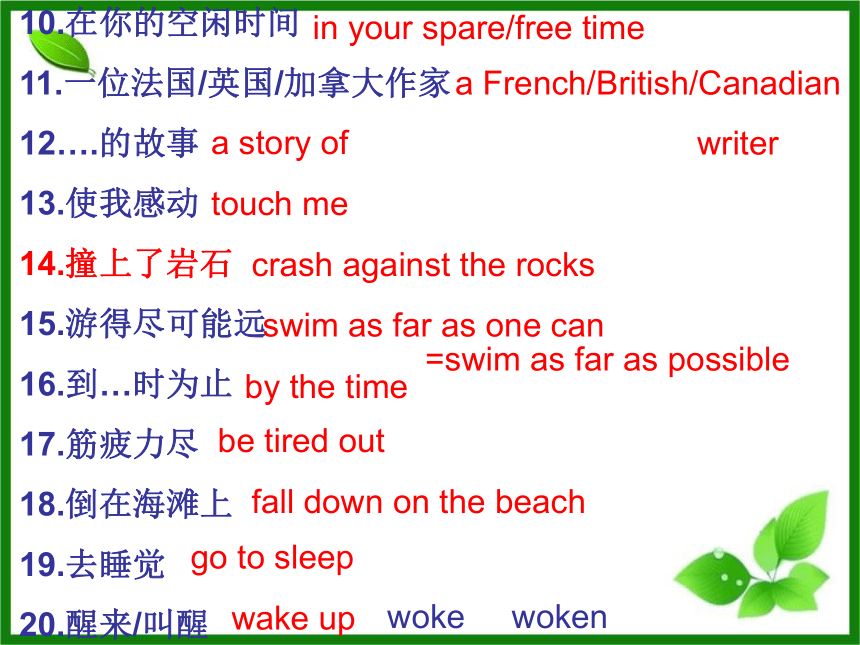
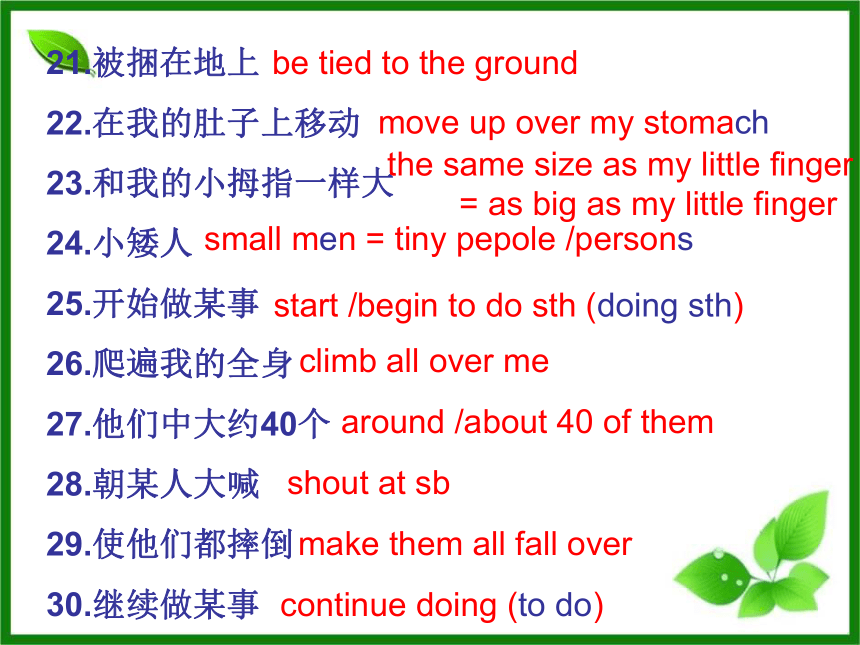
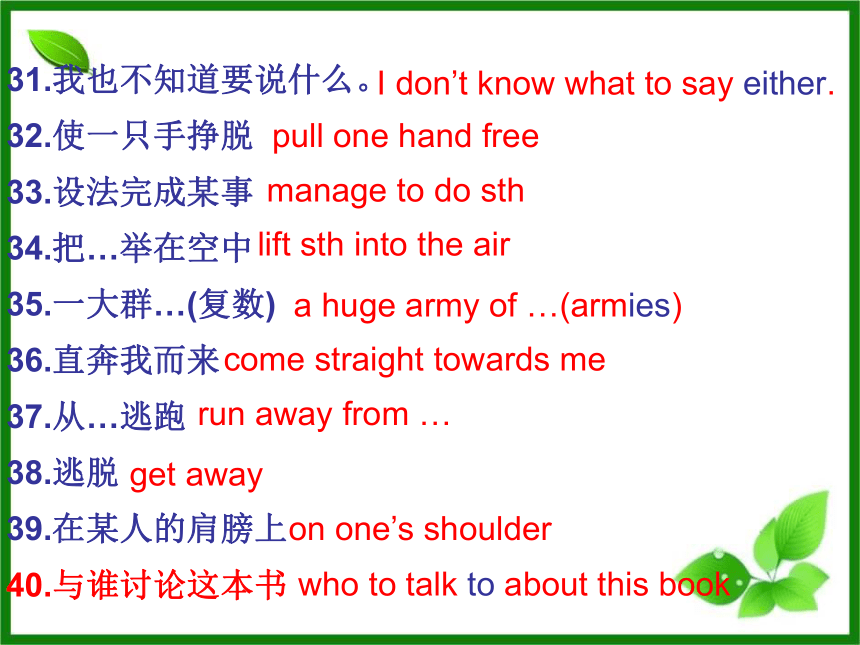
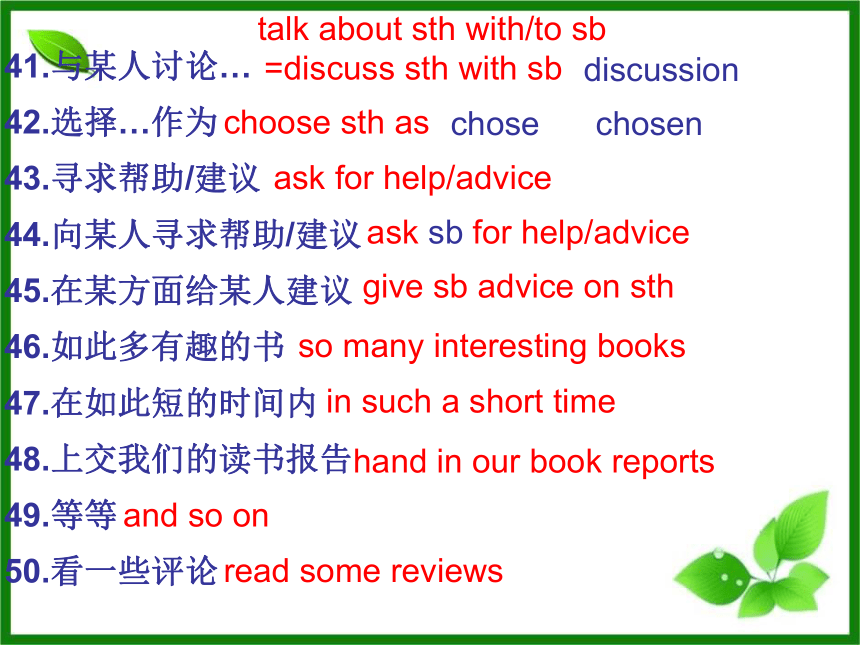
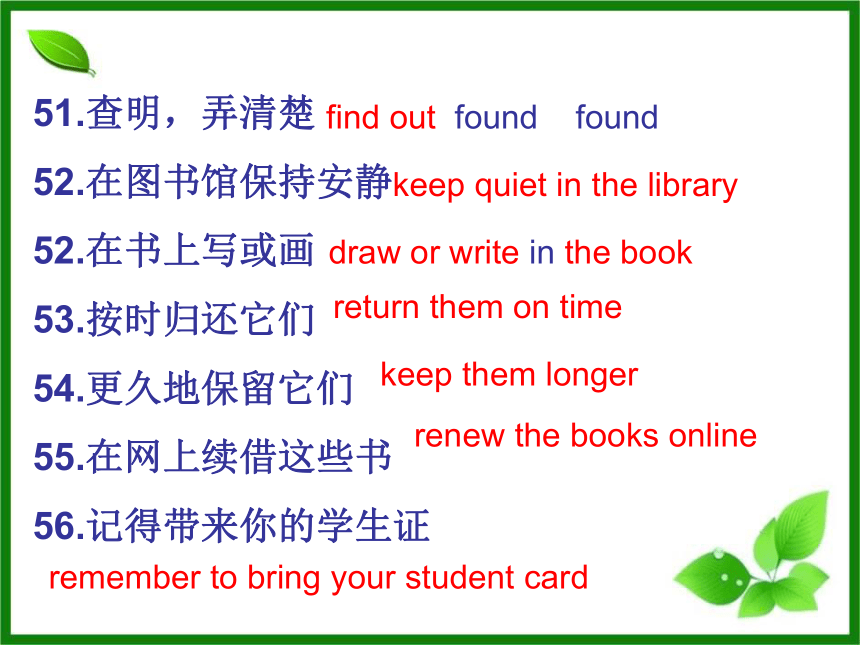
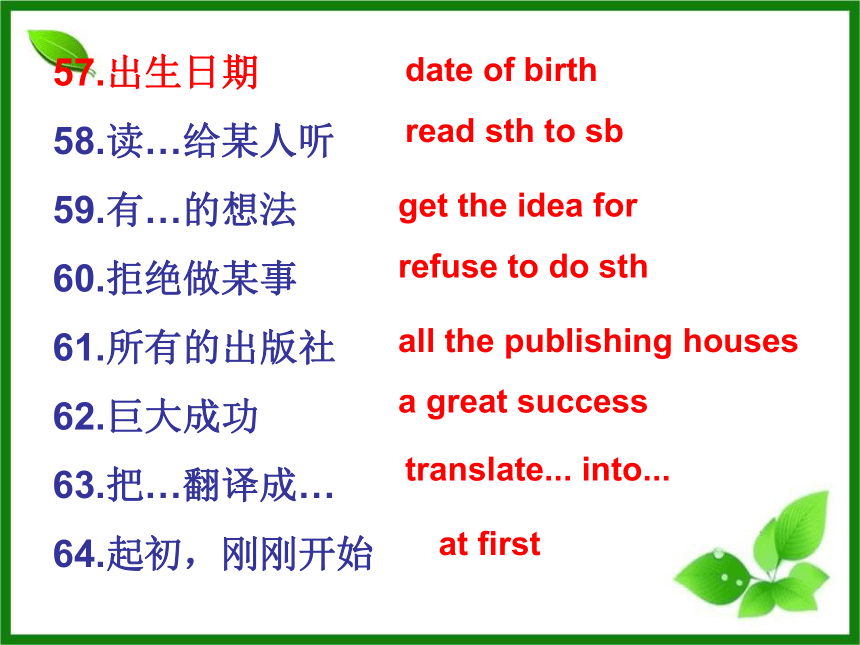
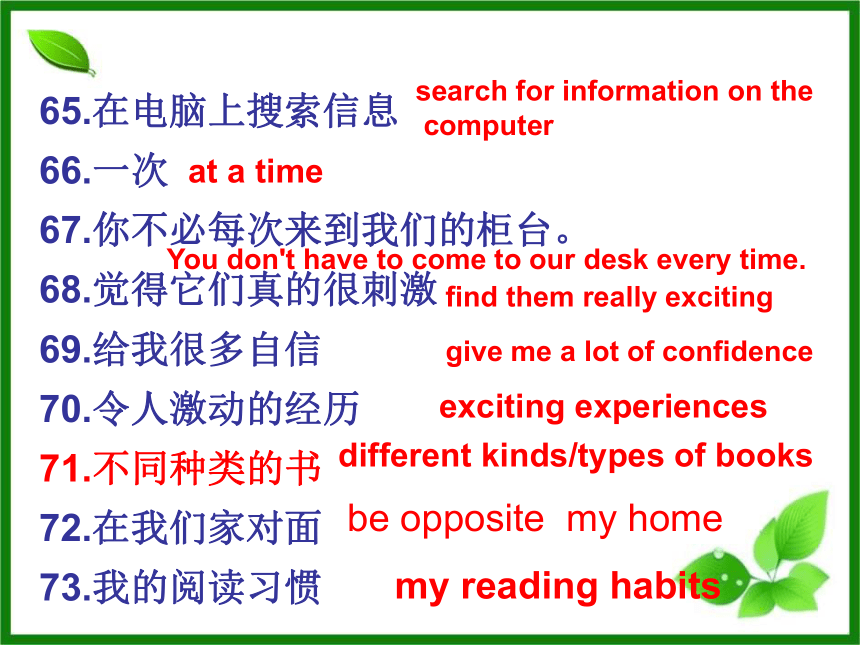
文档简介
课件48张PPT。Unit 4 复习Words n. 读物
n. 烹饪,烹调
n. 小说
n. 德国
n. 知识
adj. 空闲的;多余的
adj. 法国(人)的
n. 作者,作家
adj. 丑陋的
vt. 感动,触动read
cooking
novel
Germany
knowledge
spare
French
writer
ugly
touchprep. 紧靠,碰,撞
筋疲力尽
vt. 捆,绑
prep. 从一边到另一边
n. 腹部;胃against
be tired out
tie
over
stomachtiny
fall over
continue
either
manage
lift
army
must
unableadj. 极小的
摔倒
vt. & vi. 继续
prep. 也
vt. &vi. 勉强完成; 管理
vt. 举起,抬高
n. 大批,大群
应该,必须
adj. 不能的,不会的conj. 直到…...为止
n. 手指until
fingervi. 交;递,给
上交,递交
……等等
n. 评论hand
hand in
and so on
review
vt. 归还
准时
vt. 续借return
on time
renew1.know_______________(名词) 2.Germany______________(形容词)
3.France_______________(形容词)
4.write__________(名词)
5.ugly____________(比较级)
6.tie_____________(现在分词)
7.manage_________(名词)
8.able_____________(反义词)
9.Canada___________(形容词)
10.success___________(形容词)___________(副词) ___________(动词)
11.confident___________(名词)
12.class______________(形容词)13.stomach___________(复数)
14.advice_____________(动词)
knowledgeGermanFrenchwriterugliertyingmanagerunableCanadiansuccessfulsuccessfullysucceedconfidenceclassicalstomachsadvisePhrases 翻译下列短语:
1.一份好的读物
2.决定如何处理这些书
3.决定做某事
4.还没
5.用他们够冰箱上的盒子
6.一本关于…的书
7.二战时的德国
8.对历史书籍感兴趣
9.提高我过去的知识 a good read decide what to do with these books decide to do sth=make a decision to do not yet use them to reach the box on the fridge a book about…Germany in World War Ⅱ be interested in history books improve my knowledge of the past10.在你的空闲时间
11.一位法国/英国/加拿大作家
12….的故事
13.使我感动
14.撞上了岩石
15.游得尽可能远
16.到…时为止
17.筋疲力尽
18.倒在海滩上
19.去睡觉
20.醒来/叫醒 in your spare/free time a French/British/Canadian
writer a story of touch me crash against the rocksswim as far as one can=swim as far as possible by the time be tired out fall down on the beach go to sleep wake up woke woken21.被捆在地上
22.在我的肚子上移动
23.和我的小拇指一样大
24.小矮人
25.开始做某事
26.爬遍我的全身
27.他们中大约40个
28.朝某人大喊
29.使他们都摔倒
30.继续做某事
be tied to the ground move up over my stomach the same size as my little finger= as big as my little finger small men = tiny pepole /persons start /begin to do sth (doing sth) climb all over me around /about 40 of them shout at sb make them all fall over continue doing (to do) 31.我也不知道要说什么。
32.使一只手挣脱
33.设法完成某事
34.把…举在空中
35.一大群…(复数)
36.直奔我而来
37.从…逃跑
38.逃脱
39.在某人的肩膀上
40.与谁讨论这本书I don’t know what to say either. pull one hand free manage to do sth lift sth into the air a huge army of …(armies) come straight towards me run away from … get away on one’s shoulder who to talk to about this book 41.与某人讨论…
42.选择…作为
43.寻求帮助/建议
44.向某人寻求帮助/建议
45.在某方面给某人建议
46.如此多有趣的书
47.在如此短的时间内
48.上交我们的读书报告
49.等等
50.看一些评论
talk about sth with/to sb =discuss sth with sb discussion choose sth as chose chosen ask for help/advice ask sb for help/advice give sb advice on sth so many interesting books in such a short time hand in our book reports and so on read some reviews 51.查明,弄清楚
52.在图书馆保持安静
52.在书上写或画
53.按时归还它们
54.更久地保留它们
55.在网上续借这些书
56.记得带来你的学生证 find out found found keep quiet in the library draw or write in the book return them on time keep them longer renew the books online remember to bring your student card57.出生日期
58.读…给某人听
59.有…的想法
60.拒绝做某事
61.所有的出版社
62.巨大成功
63.把…翻译成…
64.起初,刚刚开始
date of birthread sth to sbget the idea forrefuse to do sthall the publishing housesa great successtranslate... into...at first
65.在电脑上搜索信息
66.一次
67.你不必每次来到我们的柜台。
68.觉得它们真的很刺激
69.给我很多自信
70.令人激动的经历
71.不同种类的书
72.在我们家对面
73.我的阅读习惯
search for information on the
computerat a time You don't have to come to our desk every time.find them really excitinggive me a lot of confidenceexciting experiencesdifferent kinds/types of booksbe opposite my home my reading habits
74给我许多关于----建议
75.给我开启一个全新的世界
76.中国古典四大名著
77.在繁忙一天之后帮助我放松
78.讨论读什么give me a lot of advice on ----open up a whole new world to me the four great classical Chinese novelshelp me relax after a busy daydiscuss what to read1. 我们的船撞到岩石后,我尽力游远些。
2. 当我最终感觉到脚下陆地的时候,我筋疲
力尽了。
3. 我的胳膊、腿和头发被拴在了地面上。After our ship crashed against the rocks, I swam as far as I could. By the time I finally felt the land under my feet, I was tired out.My arms, legs and hair were tied to the ground.4. 他和我的小手指一样大。
5. 这噪音使他们都摔倒了。
6. 他们继续在我的身上走来走去。
7. 我也不知道说什么。 He was the same size as my little finger. The noise made them all fall over. They continued moving across my body. I did not know what to say either.Grammar
Using question words + to-infinitives疑问词+动词不定式e.g.
Millie has decided what to read.
Daniel did not say who to talk to about this book.
Simon forgot when to meet his friends.
Kitty cannot decide which to choose first.
Sandy is wondering where to ask for help.
Amy does not know how to write the report.疑问词+动词不定式“疑问词 + 动词不定式”结构作动词的宾语。疑问词包括疑问代词who, what, which; 疑问副词when, how, where等.wonder 想知道explain 解释 explain sth to sb. 常和“疑问词 + 动词不定式”结构连用的动词和动词短语有: advise, ask, decide, discuss, find out, forget, know, tell, learn, remember, say, show, teach, think, understand, wonder, explain…He doesn’t know ________________________.
他不知道怎样处理这些垃圾。
I don’t know _____________.
我不知道说什么。
We want to learn ____________ plays.
我们想要学习如何写剧本。 what to do with the rubbishwhat to sayhow to write动词+疑问词+ to do
The teacher told the students ___________
the difficult problem.
老师告诉学生如何解决这道难题。
Can you show ________________ a paper boat?
你能给我演示怎样做一只纸船吗? 有些动词,如advise, ask, show, teach, tell等,其后可以接双宾语。 how to solve me how to makeMr Wu advised us which to choose as after-school activities.
The students asked their teacher when to hand in their work.
Millie showed us what to do next.
Daniel taught himself how to use a computer to draw.
Don’t forget to tell your mum where to meet you. V+ 宾语+疑问词+ to do有些疑问词,如what, which, whose, how many, how much等,其后可以先接一个名词,再接动词不定式。我不知道选哪个话题。I don’t know which topic to choose. They are discussing which color to paint the
walls.
You can ask your parents how much money
to take with you.V+疑问词+n+ to dowhatwhichwhosehow many/how mucheg:
我们还没决定住哪个房间。
We haven’t decided which room to live in.
他们在讨论暑假去几个地方游玩。
They are discussing how many places to visit in the summer holiday.在“疑问词 + 动词不定式”结构前,有时也可以是形容词,如sure, clear等。我不确定走哪条路。I am not sure which way to take.Suzy was not sure who to ask for help.
Are you clear when to meet at the gate
tomorrow?eg:
我不确定怎样照顾电子狗。
2. 你清楚下一步该做什么吗?
I’m not sure how to look after an e-dog.Are you clear what to do next?adj+ 疑问词+ to do“疑问词 + 动词不定式”结构在句中还可以
作主语和表语。
How to use the machine is a question.
(作主语)
The question is when to go there.
(作表语) “疑问词 + 动词不定式”作宾语时,相当于
一个由该疑问词引导的宾语从句。
Excuse me. Can you tell me how to get to
the bookshop?
=Excuse me. Can you tell me
________________ the bookshop?注意:
所有疑问词中,只有why不可以与动词不定式连用。how I can get to He didn’t know where he could find other people.
where to find other people
He didn’t know how he could break the ropes.
how to break the ropes
He wondered who he could ask for help.
who to ask for help
At last, he found out what he could do with the tiny men.
And he decided when he should leave Lilliput.
when to leave Lilliputwhat to do with the tiny men All question words can be used
in this way, except “why”√×Suzy will explain why to recommend
this book.
Suzy will explain why she recommends
this book.Let’s work out the rules1. 动词+ 疑问词+ to do
2. 动词+ 宾语+ 疑问词+ to do
3. 动词+ 疑问词+ 名词+ to do
4. 形容词+ 疑问词+ to do 1. “I must run away from them,”
Gulliver thought.must & have to 用法 2. I have to use them to reach the box on the
fridge. 3. You must not smoke in the library. 4. We do not have to go to school at weekends. =do not need tomust 表示“有义务”,“必须”做某事,强调说话人的主观看法,主要用于肯定句和疑问句,“必须,得,要”。
e.g. 你今天必须完成家庭作业。
You must finish your homework today.
must 的否定形式mustn’t, 表示禁止: “不准”。
e.g. 课堂上你们不许发出噪音。
You mustn’t?make?any?noise?in?class.小结have to 表示一种客观的需要,“不得不”。
有人称和数的变化。
e.g. 天快黑了,他现在得回家了。
It is getting dark. He has to go home now.
have to 的否定形式do not have to, 相当于need not/ do not need to.
e.g. 他们目前没有必要买电脑。
They do not have to buy a computer at
the moment.我必须努力学习功课。 (主观意愿)
I?must?work?hard?at?my?lessons.??????
我得在家照看妈妈,因为她病了。(客观需要)
I?have?to?look?after?mother?at?home.?Because?she?is?ill.?
我们不必等他。他已经离开了。
We don’t have to wait for him. He has left.
这里禁止游泳。
You mustn’t swim here. More examples1. --Must we finish all the exercises today?
--Yes, you _______. / No, you ________.
2. You __________ throw rubbish on the ground.
3. It’s going to rain. You ______________ water flowers.
4. Simon’s name is on the cover of the book.
It _______ be his. It _______ be yours.
Exercisesmustneedn’tmustn’tdon’t have tomustcan’t注意: must 还可以表示肯定猜测,意思是
“一定” 。否定的猜测是can’t.
e.g. 走了那么远的路,你一定饿了吧。
You must be hungry after walking such a
long way.
eg. 那肯定不是Lucy,她已经去了美国。
That can’t be Lucy. She has gone to the USA.Library rules (准则) You (1) keep quiet in the library.
You (2) keep the books clean and tidy.
You (3) draw or write in the books.
You (4) eat of drink in the library.
You (5) return the books on time. If you want
to keep them longer, you (6) renew them.
You (7) bring your student card every time
you go to the library, but remember to bring your library card.mustmustmustn’tmusthave todon’t have tomustn’t完成下列句子。
1. I don’t know ______________________
(在会上说什么).
2. Can you tell me ___________________
(在哪里能买到这本书)?
3. Have you decided _____________
____________ (怎样度假)?what to say at the meetingwhere to buy this bookExerciseshow to spendyour holiday Someone has put away(收拾,整理) the books.
You________do it.
A. mustn’t B. needn’t C. shouldn’t D. can’t
2. It’s the library. So you ______ know shouting is not allowed here.
A. can B. must C. need D. may
3. --Can we discuss here? --No, you ______. You will disturb other people.
A. mustn’t B. won’t C. don’t D. needn’t
4. --Must I return the book today?--No, you _____.
A. don’t B. can’t C. mustn’t D. needn’tHave a try1. --This physics problem is too difficult.
Can you show me ______, Wang Lin?
--Sure.
A. what to work it out
B. what to work out it
C. how to work it out
D. how to work out it 2. --Excuse me. Could you tell me _____
get to the nearest post office?
--Sorry, I am new here.
A. how can I B. how I could
C. how to D. what I can 3. --______ I swim here?
--I’m sorry. Children ______ swim alone
here.
A. Must; can’t B. May; must
C. Can; mustn’t D. Can’t; can 4. --Dad, must we wait until the light
becomes green?
--Yes, I'm afraid we ______. That's the
traffic rule.
A. can B. may
C. have to D. needSome exercisesA.根据中文提示写出单词。
1.Can you speak_______(法语)?
2.He was born in_______(德国).
3._______(知识)is power.
4.He is_______(有兴趣的)in playing football.
5.What do you like doing in your_______(空闲的)time?
6.I saw a huge_______(大批)of people singing and dancing there.
7. He put the ladder_______(紧靠)the wall.
8. He can't answer it_______(也).
9. There is something wrong with their_______(胃).
10.I found the man_______(捆)the dog to the tree at that time.FrenchGermanyKnowledgeinterestedsparearmyagainsteitherstomachstying11.Do you like_______(在线的)tour?
12.We_______(出版)one book each month.
13. Why did he_______(拒绝)to answer my question?
14.My father_______(航行)very well.
15.You have every chance of_______(成功).
16.The school is_______(在……的对面)the food shop.
17.He is a school_______(图书管理员).
18.He often gives me some_______(建议)on English.
19.The_______(古典的)music is very popular here.
20. It's a good_______(习惯)to get up early.onlinepublishrefusesuccessoppositelibrarianadviceclassicalhabitsailsB.用所给单词的适当形式填空。
1. After class, we continued_______ (play) the game.
2. We all managed_______ (buy) the ticket to the concert.
3. He won't come here until the film_______ (be) over.
4. I tried_______ (find) a big house.
5. I don't know how_______ (help) him finish the work.
to playto buyto helpisto findC.汉译英。
1.你知道怎样处理它吗?
Do you know_______ _______ _______ _______ it?
2.“你的朋友回来了吗?”“还没有。”
-_______ your friend come back? -_______ _______.
3.我够不着你卡车上的包。
I______ _______ the bag on your truck.
4.他们正朝海边走去。
They are_______ _______ the sea.
5.我会一直画画直到你回来。
I_______ _______ _______ _______ you _______ _______.
6.他的电脑和你的一样大。
His computer is_______ _______ _______ yours.what to do withHas Not yet can't reachwalking to will always draw until come
backas big as 7.请告诉我怎样写作文。
Please tell me_______ _______ _______ an article.
8.他不知道和谁谈有关旅行的计划。
He doesn't know_______ _______ _______ about the travel plan.
9.汤姆想知道去哪里找工作。
Tom is wondering_______ _______ _______ a job.
10.你已经决定买哪本书了吗?
Have you decided_______ _______ _______ _______?
how to write where to find who to talk which book to
buy
11.这男孩在自学法语。
The boy_______ _______ _______ _______.
12.我把这本书成两种语言。
I _______ _______ _______ _______two languages.
13.他也许认识你。
_______he_______ you.
14.你对英语感兴趣多久了?
How long_______ you_______ _______ _______ English?
learns French by himselftranslated the book intoMaybe knows have been interested
in15.我每天花半小时读英语。
I_______ half an hour_______ English every day,
16.你在睡觉之前喜欢做什么?
What do you like _______ _______ _______ to bed?
17.鞋店就在超市的对面。
The shoe shop_______ _______ the supermarket.
18.我对足球感兴趣。
I_______ _______ _______ football.spend reading doing before
going is opposite am interested in
n. 烹饪,烹调
n. 小说
n. 德国
n. 知识
adj. 空闲的;多余的
adj. 法国(人)的
n. 作者,作家
adj. 丑陋的
vt. 感动,触动read
cooking
novel
Germany
knowledge
spare
French
writer
ugly
touchprep. 紧靠,碰,撞
筋疲力尽
vt. 捆,绑
prep. 从一边到另一边
n. 腹部;胃against
be tired out
tie
over
stomachtiny
fall over
continue
either
manage
lift
army
must
unableadj. 极小的
摔倒
vt. & vi. 继续
prep. 也
vt. &vi. 勉强完成; 管理
vt. 举起,抬高
n. 大批,大群
应该,必须
adj. 不能的,不会的conj. 直到…...为止
n. 手指until
fingervi. 交;递,给
上交,递交
……等等
n. 评论hand
hand in
and so on
review
vt. 归还
准时
vt. 续借return
on time
renew1.know_______________(名词) 2.Germany______________(形容词)
3.France_______________(形容词)
4.write__________(名词)
5.ugly____________(比较级)
6.tie_____________(现在分词)
7.manage_________(名词)
8.able_____________(反义词)
9.Canada___________(形容词)
10.success___________(形容词)___________(副词) ___________(动词)
11.confident___________(名词)
12.class______________(形容词)13.stomach___________(复数)
14.advice_____________(动词)
knowledgeGermanFrenchwriterugliertyingmanagerunableCanadiansuccessfulsuccessfullysucceedconfidenceclassicalstomachsadvisePhrases 翻译下列短语:
1.一份好的读物
2.决定如何处理这些书
3.决定做某事
4.还没
5.用他们够冰箱上的盒子
6.一本关于…的书
7.二战时的德国
8.对历史书籍感兴趣
9.提高我过去的知识 a good read decide what to do with these books decide to do sth=make a decision to do not yet use them to reach the box on the fridge a book about…Germany in World War Ⅱ be interested in history books improve my knowledge of the past10.在你的空闲时间
11.一位法国/英国/加拿大作家
12….的故事
13.使我感动
14.撞上了岩石
15.游得尽可能远
16.到…时为止
17.筋疲力尽
18.倒在海滩上
19.去睡觉
20.醒来/叫醒 in your spare/free time a French/British/Canadian
writer a story of touch me crash against the rocksswim as far as one can=swim as far as possible by the time be tired out fall down on the beach go to sleep wake up woke woken21.被捆在地上
22.在我的肚子上移动
23.和我的小拇指一样大
24.小矮人
25.开始做某事
26.爬遍我的全身
27.他们中大约40个
28.朝某人大喊
29.使他们都摔倒
30.继续做某事
be tied to the ground move up over my stomach the same size as my little finger= as big as my little finger small men = tiny pepole /persons start /begin to do sth (doing sth) climb all over me around /about 40 of them shout at sb make them all fall over continue doing (to do) 31.我也不知道要说什么。
32.使一只手挣脱
33.设法完成某事
34.把…举在空中
35.一大群…(复数)
36.直奔我而来
37.从…逃跑
38.逃脱
39.在某人的肩膀上
40.与谁讨论这本书I don’t know what to say either. pull one hand free manage to do sth lift sth into the air a huge army of …(armies) come straight towards me run away from … get away on one’s shoulder who to talk to about this book 41.与某人讨论…
42.选择…作为
43.寻求帮助/建议
44.向某人寻求帮助/建议
45.在某方面给某人建议
46.如此多有趣的书
47.在如此短的时间内
48.上交我们的读书报告
49.等等
50.看一些评论
talk about sth with/to sb =discuss sth with sb discussion choose sth as chose chosen ask for help/advice ask sb for help/advice give sb advice on sth so many interesting books in such a short time hand in our book reports and so on read some reviews 51.查明,弄清楚
52.在图书馆保持安静
52.在书上写或画
53.按时归还它们
54.更久地保留它们
55.在网上续借这些书
56.记得带来你的学生证 find out found found keep quiet in the library draw or write in the book return them on time keep them longer renew the books online remember to bring your student card57.出生日期
58.读…给某人听
59.有…的想法
60.拒绝做某事
61.所有的出版社
62.巨大成功
63.把…翻译成…
64.起初,刚刚开始
date of birthread sth to sbget the idea forrefuse to do sthall the publishing housesa great successtranslate... into...at first
65.在电脑上搜索信息
66.一次
67.你不必每次来到我们的柜台。
68.觉得它们真的很刺激
69.给我很多自信
70.令人激动的经历
71.不同种类的书
72.在我们家对面
73.我的阅读习惯
search for information on the
computerat a time You don't have to come to our desk every time.find them really excitinggive me a lot of confidenceexciting experiencesdifferent kinds/types of booksbe opposite my home my reading habits
74给我许多关于----建议
75.给我开启一个全新的世界
76.中国古典四大名著
77.在繁忙一天之后帮助我放松
78.讨论读什么give me a lot of advice on ----open up a whole new world to me the four great classical Chinese novelshelp me relax after a busy daydiscuss what to read1. 我们的船撞到岩石后,我尽力游远些。
2. 当我最终感觉到脚下陆地的时候,我筋疲
力尽了。
3. 我的胳膊、腿和头发被拴在了地面上。After our ship crashed against the rocks, I swam as far as I could. By the time I finally felt the land under my feet, I was tired out.My arms, legs and hair were tied to the ground.4. 他和我的小手指一样大。
5. 这噪音使他们都摔倒了。
6. 他们继续在我的身上走来走去。
7. 我也不知道说什么。 He was the same size as my little finger. The noise made them all fall over. They continued moving across my body. I did not know what to say either.Grammar
Using question words + to-infinitives疑问词+动词不定式e.g.
Millie has decided what to read.
Daniel did not say who to talk to about this book.
Simon forgot when to meet his friends.
Kitty cannot decide which to choose first.
Sandy is wondering where to ask for help.
Amy does not know how to write the report.疑问词+动词不定式“疑问词 + 动词不定式”结构作动词的宾语。疑问词包括疑问代词who, what, which; 疑问副词when, how, where等.wonder 想知道explain 解释 explain sth to sb. 常和“疑问词 + 动词不定式”结构连用的动词和动词短语有: advise, ask, decide, discuss, find out, forget, know, tell, learn, remember, say, show, teach, think, understand, wonder, explain…He doesn’t know ________________________.
他不知道怎样处理这些垃圾。
I don’t know _____________.
我不知道说什么。
We want to learn ____________ plays.
我们想要学习如何写剧本。 what to do with the rubbishwhat to sayhow to write动词+疑问词+ to do
The teacher told the students ___________
the difficult problem.
老师告诉学生如何解决这道难题。
Can you show ________________ a paper boat?
你能给我演示怎样做一只纸船吗? 有些动词,如advise, ask, show, teach, tell等,其后可以接双宾语。 how to solve me how to makeMr Wu advised us which to choose as after-school activities.
The students asked their teacher when to hand in their work.
Millie showed us what to do next.
Daniel taught himself how to use a computer to draw.
Don’t forget to tell your mum where to meet you. V+ 宾语+疑问词+ to do有些疑问词,如what, which, whose, how many, how much等,其后可以先接一个名词,再接动词不定式。我不知道选哪个话题。I don’t know which topic to choose. They are discussing which color to paint the
walls.
You can ask your parents how much money
to take with you.V+疑问词+n+ to dowhatwhichwhosehow many/how mucheg:
我们还没决定住哪个房间。
We haven’t decided which room to live in.
他们在讨论暑假去几个地方游玩。
They are discussing how many places to visit in the summer holiday.在“疑问词 + 动词不定式”结构前,有时也可以是形容词,如sure, clear等。我不确定走哪条路。I am not sure which way to take.Suzy was not sure who to ask for help.
Are you clear when to meet at the gate
tomorrow?eg:
我不确定怎样照顾电子狗。
2. 你清楚下一步该做什么吗?
I’m not sure how to look after an e-dog.Are you clear what to do next?adj+ 疑问词+ to do“疑问词 + 动词不定式”结构在句中还可以
作主语和表语。
How to use the machine is a question.
(作主语)
The question is when to go there.
(作表语) “疑问词 + 动词不定式”作宾语时,相当于
一个由该疑问词引导的宾语从句。
Excuse me. Can you tell me how to get to
the bookshop?
=Excuse me. Can you tell me
________________ the bookshop?注意:
所有疑问词中,只有why不可以与动词不定式连用。how I can get to He didn’t know where he could find other people.
where to find other people
He didn’t know how he could break the ropes.
how to break the ropes
He wondered who he could ask for help.
who to ask for help
At last, he found out what he could do with the tiny men.
And he decided when he should leave Lilliput.
when to leave Lilliputwhat to do with the tiny men All question words can be used
in this way, except “why”√×Suzy will explain why to recommend
this book.
Suzy will explain why she recommends
this book.Let’s work out the rules1. 动词+ 疑问词+ to do
2. 动词+ 宾语+ 疑问词+ to do
3. 动词+ 疑问词+ 名词+ to do
4. 形容词+ 疑问词+ to do 1. “I must run away from them,”
Gulliver thought.must & have to 用法 2. I have to use them to reach the box on the
fridge. 3. You must not smoke in the library. 4. We do not have to go to school at weekends. =do not need tomust 表示“有义务”,“必须”做某事,强调说话人的主观看法,主要用于肯定句和疑问句,“必须,得,要”。
e.g. 你今天必须完成家庭作业。
You must finish your homework today.
must 的否定形式mustn’t, 表示禁止: “不准”。
e.g. 课堂上你们不许发出噪音。
You mustn’t?make?any?noise?in?class.小结have to 表示一种客观的需要,“不得不”。
有人称和数的变化。
e.g. 天快黑了,他现在得回家了。
It is getting dark. He has to go home now.
have to 的否定形式do not have to, 相当于need not/ do not need to.
e.g. 他们目前没有必要买电脑。
They do not have to buy a computer at
the moment.我必须努力学习功课。 (主观意愿)
I?must?work?hard?at?my?lessons.??????
我得在家照看妈妈,因为她病了。(客观需要)
I?have?to?look?after?mother?at?home.?Because?she?is?ill.?
我们不必等他。他已经离开了。
We don’t have to wait for him. He has left.
这里禁止游泳。
You mustn’t swim here. More examples1. --Must we finish all the exercises today?
--Yes, you _______. / No, you ________.
2. You __________ throw rubbish on the ground.
3. It’s going to rain. You ______________ water flowers.
4. Simon’s name is on the cover of the book.
It _______ be his. It _______ be yours.
Exercisesmustneedn’tmustn’tdon’t have tomustcan’t注意: must 还可以表示肯定猜测,意思是
“一定” 。否定的猜测是can’t.
e.g. 走了那么远的路,你一定饿了吧。
You must be hungry after walking such a
long way.
eg. 那肯定不是Lucy,她已经去了美国。
That can’t be Lucy. She has gone to the USA.Library rules (准则) You (1) keep quiet in the library.
You (2) keep the books clean and tidy.
You (3) draw or write in the books.
You (4) eat of drink in the library.
You (5) return the books on time. If you want
to keep them longer, you (6) renew them.
You (7) bring your student card every time
you go to the library, but remember to bring your library card.mustmustmustn’tmusthave todon’t have tomustn’t完成下列句子。
1. I don’t know ______________________
(在会上说什么).
2. Can you tell me ___________________
(在哪里能买到这本书)?
3. Have you decided _____________
____________ (怎样度假)?what to say at the meetingwhere to buy this bookExerciseshow to spendyour holiday Someone has put away(收拾,整理) the books.
You________do it.
A. mustn’t B. needn’t C. shouldn’t D. can’t
2. It’s the library. So you ______ know shouting is not allowed here.
A. can B. must C. need D. may
3. --Can we discuss here? --No, you ______. You will disturb other people.
A. mustn’t B. won’t C. don’t D. needn’t
4. --Must I return the book today?--No, you _____.
A. don’t B. can’t C. mustn’t D. needn’tHave a try1. --This physics problem is too difficult.
Can you show me ______, Wang Lin?
--Sure.
A. what to work it out
B. what to work out it
C. how to work it out
D. how to work out it 2. --Excuse me. Could you tell me _____
get to the nearest post office?
--Sorry, I am new here.
A. how can I B. how I could
C. how to D. what I can 3. --______ I swim here?
--I’m sorry. Children ______ swim alone
here.
A. Must; can’t B. May; must
C. Can; mustn’t D. Can’t; can 4. --Dad, must we wait until the light
becomes green?
--Yes, I'm afraid we ______. That's the
traffic rule.
A. can B. may
C. have to D. needSome exercisesA.根据中文提示写出单词。
1.Can you speak_______(法语)?
2.He was born in_______(德国).
3._______(知识)is power.
4.He is_______(有兴趣的)in playing football.
5.What do you like doing in your_______(空闲的)time?
6.I saw a huge_______(大批)of people singing and dancing there.
7. He put the ladder_______(紧靠)the wall.
8. He can't answer it_______(也).
9. There is something wrong with their_______(胃).
10.I found the man_______(捆)the dog to the tree at that time.FrenchGermanyKnowledgeinterestedsparearmyagainsteitherstomachstying11.Do you like_______(在线的)tour?
12.We_______(出版)one book each month.
13. Why did he_______(拒绝)to answer my question?
14.My father_______(航行)very well.
15.You have every chance of_______(成功).
16.The school is_______(在……的对面)the food shop.
17.He is a school_______(图书管理员).
18.He often gives me some_______(建议)on English.
19.The_______(古典的)music is very popular here.
20. It's a good_______(习惯)to get up early.onlinepublishrefusesuccessoppositelibrarianadviceclassicalhabitsailsB.用所给单词的适当形式填空。
1. After class, we continued_______ (play) the game.
2. We all managed_______ (buy) the ticket to the concert.
3. He won't come here until the film_______ (be) over.
4. I tried_______ (find) a big house.
5. I don't know how_______ (help) him finish the work.
to playto buyto helpisto findC.汉译英。
1.你知道怎样处理它吗?
Do you know_______ _______ _______ _______ it?
2.“你的朋友回来了吗?”“还没有。”
-_______ your friend come back? -_______ _______.
3.我够不着你卡车上的包。
I______ _______ the bag on your truck.
4.他们正朝海边走去。
They are_______ _______ the sea.
5.我会一直画画直到你回来。
I_______ _______ _______ _______ you _______ _______.
6.他的电脑和你的一样大。
His computer is_______ _______ _______ yours.what to do withHas Not yet can't reachwalking to will always draw until come
backas big as 7.请告诉我怎样写作文。
Please tell me_______ _______ _______ an article.
8.他不知道和谁谈有关旅行的计划。
He doesn't know_______ _______ _______ about the travel plan.
9.汤姆想知道去哪里找工作。
Tom is wondering_______ _______ _______ a job.
10.你已经决定买哪本书了吗?
Have you decided_______ _______ _______ _______?
how to write where to find who to talk which book to
buy
11.这男孩在自学法语。
The boy_______ _______ _______ _______.
12.我把这本书成两种语言。
I _______ _______ _______ _______two languages.
13.他也许认识你。
_______he_______ you.
14.你对英语感兴趣多久了?
How long_______ you_______ _______ _______ English?
learns French by himselftranslated the book intoMaybe knows have been interested
in15.我每天花半小时读英语。
I_______ half an hour_______ English every day,
16.你在睡觉之前喜欢做什么?
What do you like _______ _______ _______ to bed?
17.鞋店就在超市的对面。
The shoe shop_______ _______ the supermarket.
18.我对足球感兴趣。
I_______ _______ _______ football.spend reading doing before
going is opposite am interested in
